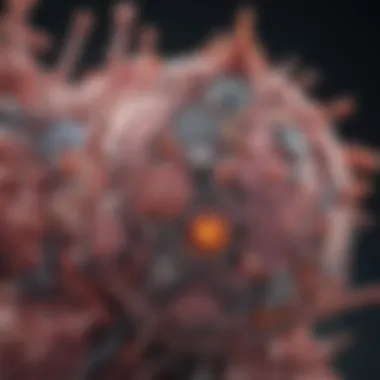Endocrine Therapy for Cancer: Mechanisms and Future


Intro
Endocrine treatment plays a significant role in oncology, particularly for the management of hormone-sensitive cancers like breast and prostate cancer. As research advances, understanding the mechanisms behind endocrine therapy is essential. This article delves into the intricacies of endocrine treatment, focusing on its methodologies, applications in clinical practice, and future research directions.
The relevance of endocrine therapy cannot be overstated. Not only does it provide therapeutic options for specific cancer types, but it also highlights the importance of hormonal regulation in tumor development and progression. Given the complexities involved, a thorough examination of the methodologies and their implications in treatment approaches is warranted.
Understanding Endocrine Treatment
Endocrine treatment plays a critical role in oncology, particularly in addressing hormone-sensitive cancers. This approach utilizes hormonal signals to combat tumor growth, marking it as a pathway of substantial clinical relevance. Understanding endocrine treatment is not only about grasping its mechanisms but also appreciating its place in the broader therapeutic landscape. As various cancers are influenced by hormones, targeted therapies provide unique opportunities for patient management.
The ability to tailor treatment based on hormonal receptor status can lead to significant benefits. These can include improved patient outcomes, fewer side effects compared with traditional therapies, and heightened overall treatment efficacy. Recognizing the importance of endocrine treatment fosters an appreciation for its complexities, paving the way for deeper discussions on its applications and innovations.
Definition of Endocrine Treatment
Endocrine treatment refers to the use of medications that manipulate hormonal activities in the body to control the growth of certain tumors. This therapy is primarily aimed at cancers that are sensitive to hormones, such as breast or prostate cancer. By either blocking hormone receptors or reducing hormone levels, the growth of tumors can be significantly hindered or entirely halted. The precise targeting of these treatments offers a strategic advantage in cancer therapy, as they often seek to exploit the specific biology of the tumor.
Historical Overview
Key Milestones in Endocrine Treatment
The history of endocrine treatment is marked by several key milestones that have laid the foundation for modern therapeutic practices. Early steps included the discovery of hormone receptors and their role in tumor growth. For instance, the introduction of tamoxifen in the 1970s represented a leap forward in treating estrogen receptor-positive breast cancer. This milestone showcased how understanding hormonal pathways could directly influence clinical strategies.
The innovation of aromatase inhibitors in the late 1990s provided additional tools for managing estrogen-dependent tumors. These agents allowed for a more refined approach, reducing estrogen production in the body, thereby preventing tumor progression. The crucial characteristic of these milestones is their focus on bringing hormone-targeted strategies from the lab to clinical practice. This progression aids in explaining why endocrine treatments are a mainstay in oncology today.
Evolution of Therapeutic Approaches
The evolution of therapeutic approaches in endocrine treatment has mirrored advances in science and technology. Over the decades, initial hormonal therapies evolved into more refined methods. For example, modern therapies often include a combination of endocrine methods and other modalities, such as chemotherapy or immunotherapy. This evolution is marked by a realization that single-agent therapies may not be sufficient for all patients. Clinicians are now encouraged to consider patients' individual receptor statuses and tumor characteristics when selecting a therapy.
Such an approach highlights the recognition of personalized medicine, ensuring that therapies are both effective and tailored. The notable feature is the integration of multiple therapeutic avenues, bringing new hope for improved outcomes. However, this complexity can also be a hurdle for both clinicians and patients, necessitating ongoing education and communication.
Mechanisms of Action
Hormone Receptor Modulation
Hormone receptor modulation is a fundamental mechanism in endocrine treatment. This involves either activating or blocking specific hormone receptors to influence tumor behavior. For instance, tamoxifen acts as a selective estrogen receptor modulator, binding to estrogen receptors but preventing the estrogen from exerting its growth-promoting effects on tumors.
This mechanism is particularly beneficial because it directly addresses a tumor's dependency on hormonal signals for growth. However, the unique feature of this approach is the potential for resistance. Some tumors may adapt to hormonal changes, leading to treatment failure. Therefore, ongoing research aims to understand and counteract these adaptations.
Regulation of Tumor Growth
Another crucial aspect is the regulation of tumor growth through endocrine treatment. This involves the systemic control of hormone levels, which directly impacts cellular proliferation and survival. For example, androgen deprivation therapy used in prostate cancer works by drastically lowering testosterone levels. This reduction not only diminishes the stimulatory signals for cancer growth but can also induce apoptosis in susceptible tumor cells.
The key characteristic of this regulation is its broad impact — targeting the entire endocrine system rather than just the tumor cells. This approach may lead to improved overall management of the disease, addressing various tumor functions. Nonetheless, the widespread effects can also result in significant side effects, necessitating careful patient monitoring and management.
"Understanding these mechanisms provides insight into how endocrine treatment influences cancer management."
Types of Hormone-Sensitive Cancers
Endocrine treatment for cancer is closely linked to various hormone-sensitive cancers. Understanding these types is crucial as it directly affects treatment strategies and patient outcomes. Hormone-sensitive cancers are those where the growth and progression are influenced by hormones. This characteristic allows for targeted therapeutic approaches, leading to better management of the disease.
Several types of cancers, specifically breast, prostate, thyroid, and endometrial cancers, fall into the category of hormone-sensitive tumors. Each presents unique features regarding their response to endocrine therapy. By concentrating on these types, the article provides insights into effective treatment protocols, considerations for patient selection, and the overall impact on improving survival rates.
Breast Cancer
Breast cancer is perhaps the most recognized hormone-sensitive cancer. A significant subset involves estrogen receptor positive cancers. This group is defined by the presence of estrogen receptors on the cancer cells, which often drives tumor development and growth.
Estrogen Receptor Positive Cancers
Estrogen receptor positive cancers are notable because they represent a majority of breast cancer cases. This characteristic is particularly significant as it opens the door to various treatment options that target the hormone pathways. Utilizing drugs that block estrogen or lower its production can effectively manage this type of cancer.
These cancers tend to respond favorably to endocrine therapies, such as tamoxifen and aromatase inhibitors like anastrozole and letrozole.


However, it is important to note that while these therapies can be effective, resistance can develop over time, leading to treatment challenges.
Treatment Protocols
Treatment protocols for estrogen receptor positive breast cancer commonly include a combination of surgery, radiation, and endocrine therapy. For instance, patients often undergo surgery to remove the tumor, followed by radiation to eliminate any remaining cancer cells.
The integration of endocrine therapy plays a crucial role in preventing recurrence, especially in post-menopausal women. However, it's notable that selection of appropriate protocols requires careful consideration of the individual patient's cancer characteristics, overall health, and preferences.
Prostate Cancer
Prostate cancer is another significant hormone-sensitive cancer, largely driven by androgen receptors. Understanding this relationship is key to effective treatment.
Androgen Receptor Pathways
Androgen receptor pathways are central to the development and progression of prostate cancer. Testosterone and its derivatives stimulate cancer cell growth, making these pathways prime targets for endocrine therapy.
This characteristic of prostate cancer necessitates treatments that aim to disrupt these signals, which can significantly slow the progression of the disease.
The popular approach includes androgen deprivation therapy, which can effectively reduce tumor size and extend patient survival.
Therapeutic Options
Prostate cancer therapeutic options include LHRH agonists, which reduce hormone levels leading to decreased cancer cell growth. Additionally, antiandrogens like bicalutamide provide another avenue of therapy. These options highlight the diverse strategies available in managing hormone-sensitive tumors, making tailored approaches more feasible.
In terms of efficacy, these therapeutic options can offer significant benefits, but they also come with potential side effects, which must be considered in treatment planning.
Other Cancers
Beyond breast and prostate cancer, other cancers also exhibit hormone sensitivity.
Thyroid Cancer
Thyroid cancer can be influenced by thyroid hormones, making it another area where endocrine therapy can have an impact. This type often requires specific treatment protocols focused on regulating hormone levels and tumor size.
The unique feature of thyroid cancer is its generally favorable prognosis with proper management, but variations in hormone sensitivity can influence treatment effectiveness.
Endometrial Cancer
Endometrial cancer represents another hormone-sensitive type, where estrogen plays a critical role in tumor development. The distinctive aspect is that it often occurs in postmenopausal women, where the treatment may include progestin therapy to counteract estrogen's effects.
Understanding these cancers provides essential context to the application of endocrine therapies. Each type presents unique challenges and opportunities, which are crucial for the ongoing evolution of cancer treatment strategies.
Pharmacological Agents in Endocrine Therapy
Pharmacological agents play a crucial role in endocrine therapy for cancer. These agents interact with hormonal pathways to inhibit tumor growth and progress. Understanding these drugs helps in selecting appropriate treatment strategies and improving patient outcomes. Each category of agents has unique mechanisms and applications, thereby contributing distinctly to the broader treatment landscape.
Aromatase Inhibitors
Aromatase inhibitors are significant in managing hormone-sensitive breast cancer, particularly in postmenopausal women. By blocking the aromatase enzyme, these inhibitors reduce estrogen production, which is vital since many breast cancers rely on estrogen for growth. Examples of these agents include anastrozole, letrozole, and exemestane. This class of drugs has shown a consistent ability to lower recurrences, and their use can prolong overall survival rates in this cancer subgroup. They are often well-tolerated by patients but may have side effects such as joint pain and osteoporosis, necessitating regular monitoring.
Selective Estrogen Receptor Modulators (SERMs)
Selective estrogen receptor modulators, or SERMs, like tamoxifen, serve dual functions in treating breast cancer. They act as estrogen agonists in some tissues and antagonists in others. This characteristic allows them to block estrogen's effects in breast tissue while potentially benefiting bone health. Tamoxifen is well studied and widely used, especially in premenopausal women. However, side effects can include the risk of uterine cancer and thromboembolic events, which require careful patient evaluation before prescription.
Androgen Deprivation Therapy
Androgen deprivation therapy focuses on the hormonal treatment of prostate cancer. Two primary classes fall under this category: LHRH agonists and antiandrogens. By reducing androgen levels or blocking their action, these agents prevent tumor growth and progression.
LHRH Agonists
LHRH agonists, such as leuprolide and goserelin, disrupt the hormonal signaling necessary for prostate cancer cell survival. They work by initially stimulating the release of luteinizing hormone, leading to a temporary surge in testosterone. Eventually, this feedback system suppresses further production of testosterone. Their benefit includes significant tumor shrinkage and symptomatic relief. However, potential downsides can include hot flashes and loss of libido, posing challenges for patient adherence to long-term treatment.
Antiandrogens


Antiandrogens, such as bicalutamide and enzalutamide, directly block the androgen receptors, making them widely used in combination with LHRH agonists. This cooperation enhances effectiveness against prostate cancer. One appealing feature of antiandrogens is their ability to target residual tumor cells that may remain after androgen deprivation. Yet, side effects like liver toxicity and gastrointestinal symptoms can occur, thus requiring a careful balance of benefits versus risks in treatment planning.
In summary, understanding the pharmacological agents in endocrine therapy and their mechanisms is vital for enhancing treatment strategies in hormone-sensitive cancers. Each drug class presents a unique profile of effects, benefits, and potential challenges that must be considered in tailoring patient-centric treatment plans.
Clinical Applications of Endocrine Treatment
Endocrine treatment plays a critical role in managing hormone-sensitive cancers. These treatments leverage the hormonal mechanisms that drive the growth of specific tumors, particularly in breast and prostate cancer. This section explores the clinical aspects of endocrine treatment, focusing on its indications, combination with other therapies, and how treatment efficacy is monitored. The discussion elucidates how these applications not only improve patient outcomes but also underline the importance of tailored interventions in oncology.
Indications and Patient Selection
The appropriate selection of patients for endocrine treatment significantly impacts its effectiveness. Candidates are usually those diagnosed with hormone-sensitive malignancies. For breast cancer, particularly estrogen receptor-positive subtypes, endocrine therapy is crucial for both adjuvant treatment and disease recurrence prevention. Similarly, for prostate cancer, patients with high androgen receptor expression are prime candidates for androgen deprivation therapy.
Critical factors influencing patient selection include:
- Tumor type and characteristics: Understanding the specific cancer type and its hormonal sensitivities is crucial.
- Stage of cancer: Early-stage cancers often respond better to endocrine therapy.
- Patient's overall health: Comorbidities and treatment tolerability are essential considerations.
Combination Therapies
Combination therapies enhance the efficacy of endocrine treatment through synergistic effects. Here are two significant considerations under this subsection:
Chemotherapy Integration
Chemotherapy integration with endocrine therapy has gained attention in complex cancer cases. The specific aspect of this approach is its ability to target rapid tumor growth while endocrine therapy aims at the hormonal pathways. This dual approach is beneficial, particularly in cases of advanced breast or prostate cancer.
The key characteristic of chemotherapy integration is its potential to shrink tumors quickly, ensuring patients do not progress to more advanced stages. Chemotherapy combined with endocrine therapy can be a powerful strategy, especially when hormonal agents alone are insufficient. This combination offers a unique feature: it tackles the cancer from multiple angles.
However, there are disadvantages to consider. The side effects of chemotherapy can compound those of endocrine therapy, leading to a need for comprehensive management plans.
Radiation Considerations
Radiation therapy also plays a significant role when combined with endocrine treatment. It serves as a local treatment option aimed at killing cancer cells that may not respond well to hormonal therapies alone. The particular aspect here is the focus on localized disease control.
The key characteristic of radiation in this context is its ability to provide immediate control over tumor size while endocrine agents take effect. This can be especially useful for larger tumors known to cause local symptoms.
However, the unique feature of radiation introduces another dimension of side effects, as it can cause damage to nearby healthy tissues. Thus, careful planning is required to maximize benefits while minimizing potential harm.
Monitoring Treatment Efficacy
Monitoring the efficacy of endocrine treatment is vital for ensuring optimal patient outcomes. Several methods are employed to assess how well the treatment is working:
- Hormonal level assessments: Measuring hormone levels can indicate if the treatment is effectively suppressing tumor-driven hormones.
- Imaging studies: Regular imaging helps track tumor size and response to treatment over time.
- Patient-reported outcomes: Understanding the patient's perspective on their quality of life and symptoms is essential for comprehensive assessment.
In summary, the clinical applications of endocrine treatment are multifaceted. By understanding indications, exploring combination therapies, and establishing solid monitoring strategies, healthcare providers can enhance the efficacy and impact of these vital therapeutic interventions. This approach underscores the ongoing evolution and adaptation of cancer treatment strategies in the quest for improved patient outcomes.
Challenges and Limitations
Understanding the challenges and limitations associated with endocrine treatment for cancer is crucial for optimizing its application in clinical practice. The landscape of cancer therapy is ever-evolving, with endocrine therapy standing as a prominent strategy, especially for hormone-sensitive tumors. However, it is essential to address specific elements that impede efficacy and patient access.
Drug Resistance
Mechanisms of Resistance
Drug resistance in endocrine therapy presents a significant hurdle. The mechanisms of resistance can typically stem from genetic mutations, alterations in hormone receptor expression, or even downstream signaling pathway changes. These factors can lead to treatment failure, which makes understanding them pivotal to enhancing therapeutic outcomes.
Key characteristics of these mechanisms include mutations in the estrogen receptor, which can alter its affinity to drugs. Such alterations often render first-line treatments ineffective, necessitating a shift to alternative therapies. This aspect is a popular choice for our discussion because understanding resistance mechanisms helps refine treatment strategies.
A unique feature of resistance includes the potential for cross-resistance among similar therapeutic agents. This complicates treatment regimens, making it imperative for researchers and clinicians to stay ahead in understanding resistance profiles, which can present both advantages in identifying alternative treatments and disadvantages in the unpredictability of patient responses.
Clinical Implications
The clinical implications of drug resistance are profound. They can affect not only treatment effectiveness but also overall patient survival and quality of life. Clinicians need to be aware of resistance development to adapt strategies in real-time. A key characteristic of clinical implications is the potential need for personalized treatment adaptations.


This is an important topic because it illustrates how drug resistance can alter the arc of cancer therapy. The unique feature here is that resistant strains may lead to increased healthcare costs due to the need for additional therapies. This necessitates careful planning and ongoing patient monitoring, showcasing both a management challenge and opportunity for enhanced patient care.
Side Effects and Management
The side effects associated with endocrine treatments drive a significant amount of patient discontinuation and non-compliance. Hormonal therapies can induce a range of reactions, from mild symptoms such as hot flashes to severe issues such as thromboembolic events. Management of these side effects is crucial, as they can deter patients from adhering to prescribed regimens.
Appropriate management strategies often include patient education, supportive care measures, and medication adjustments to alleviate adverse effects. These interventions result in improved patient satisfaction and adherence to treatment, thus leading to better therapeutic outcomes.
Access to Therapy
Access to endocrine therapy remains a contentious issue. Not every patient has equal opportunities to receive these vital treatments. The understanding of how social factors play roles in access is necessary for developing equitable healthcare approaches.
Healthcare Disparities
Healthcare disparities often reflect socioeconomic status, geographic location, and systemic biases that hinder access to therapy. The critical aspect of healthcare disparities is that they can significantly affect outcomes for underserved populations. By focusing on this aspect, we can push for policy changes that promote equitable treatment access.
A unique feature of these disparities is their tendency to perpetuate health inequalities. Not acknowledging this area risks reinforcing inequalities present in current healthcare systems, which can lead to both ethical concerns and poor health outcomes for marginalized communities.
Economic Barriers
Economic barriers also play a massive role in access to endocrine therapy. Many patients may face prohibitive costs, inclusive of medications and ongoing monitoring. This situation can restrict access, making the need for systemic changes clear.
Key characteristics include the influence of insurance coverage on treatment availability. High out-of-pocket expenses can lead patients to forego necessary therapies. A unique advantage of addressing these barriers is that improving economic access can ultimately lead to better health outcomes. Initiatives aimed at reducing costs or improving insurance coverage should be significant considerations in enhancing access to endocrine treatments.
Future Directions in Endocrine Therapy
The exploration of future directions in endocrine therapy is essential for understanding the evolving landscape of cancer management. As advancements in science continue, it is crucial to evaluate how new methodologies can improve patient outcomes. This section discusses emerging trends, innovations in drug development, personalized medicine approaches, and the integration of immunotherapy with endocrine treatments. Each of these elements plays a significant role in shaping future strategies against hormone-sensitive cancers.
Innovations in Pharmacotherapy
New Drug Development
New drug development signifies a crucial frontier in endocrine therapy. This approach focuses on creating novel pharmacological agents that specifically target hormone-dependent cancer pathways. The key characteristic of new drug development is its ability to introduce therapies that can enhance efficacy beyond currently available treatments. This becomes beneficial as therapy resistance becomes a common challenge.
For example, drugs like palbociclib or abemaciclib demonstrate unique features that specifically inhibit cell cycle progression in breast cancer, mirroring the intricacies of hormone regulation. Such therapies can lead to continuous improvement in treatment effectiveness, although they also come with challenges such as managing side effects and understanding varying responses in diverse patient populations.
Biomarkers in Treatment
Biomarkers in treatment represent another vital innovation in endocrine therapy. These are biological indicators that can predict responses to specific therapies, thus amplifying the personalization of treatment regimens. The key characteristic of biomarkers is their potential to inform clinical decisions, ensuring that the right therapies are matched with the right patients. It makes them a compelling choice for future treatments.
Unique features of biomarkers include the ability to guide therapy selection based on tumor characteristics, such as hormone receptor status in breast cancer. While they enhance precision in treatment, there are challenges such as the need for comprehensive testing and validation processes to ensure reliability across different populations.
Personalized Medicine Approaches
Personalized medicine further elevates the possibilities within endocrine therapy. By tailoring treatment based on individual genetic characteristics, more effective outcomes may be achieved. Each patient's unique molecular profile can dictate the specific types of agents used, leading to optimizations in therapy.
The relevance of personalized medicine lies in its capacity to minimize unnecessary side effects and maximize therapeutic impact, allowing for a more humane approach to cancer care. However, personalized medicine also faces hurdles, such as the need for advanced diagnostic tools and the potential for increased costs related to individual treatment plans.
Integration with Immunotherapy
The integration of immunotherapy into endocrine treatment strategies represents a groundbreaking direction for future cancer therapies. Combining these two approaches may enhance immune responses while effectively modulating hormonal pathways. The potential synergy could lead to prolonged patient survival and improved quality of life.
Although this integration appears promising, it requires more research to identify optimal combinations and treatment pathways. Clinicians must navigate complex interactions between hormonal and immune responses to maximize benefits without exacerbating side effects.
The future of endocrine therapy hinges on continual innovation and an integrated approach towards patient care.
Finale
In the landscape of oncology, the exploration of endocrine treatment marks a significant advance in managing hormone-sensitive tumors. This article encapsulates the critical components surrounding endocrine therapy, elucidating its mechanisms, applications, and the potential challenges faced in modern clinical practice. By grasping these key elements, various stakeholders, including researchers, healthcare practitioners, and policymakers, can prioritize effective treatment strategies that target specific hormone pathways.
The discussion of endocrine therapy is not only relevant for its immediate clinical benefits but also for understanding its role in shaping future therapeutic protocols. As this treatment continues to evolve, it allows for more tailored approaches, promising improved patient outcomes while minimizing unnecessary interventions. The versatility of endocrine therapy in addressing various cancers confirms its status as a mainstay in oncologic therapies.
Recap of Key Concepts
Endocrine treatment operates primarily by manipulating hormone pathways to suppress tumor growth. Key mechanisms include hormone receptor modulation and interference with tumor proliferation driven by hormones. Different cancers exhibit distinct dependencies on these hormonal pathways, notably found in breast and prostate cancer. Pharmacological modalities such as aromatase inhibitors and selective estrogen receptor modulators exemplify the tangible applications of this treatment paradigm. Additionally, clinical applications highlight the importance of patient selection and the integration of endocrine therapy with other treatment modalities.
The Role of Ongoing Research
Ongoing research remains pivotal in the realm of endocrine therapy. Innovations in pharmacotherapy are exploring novel agents and combination therapies. The focus is also on utilizing biomarkers to personalize treatments, thus enhancing their efficacy. Importantly, understanding mechanisms of resistance continues to be a focal point. With new insights emerging, the integration of endocrine therapy with immunotherapy presents opportunities to further amplify treatment success and overcome existing barriers in care. As research progresses, the advocacy for equitable access and understanding the economic implications of these therapies becomes central to achieving optimal patient outcomes.



